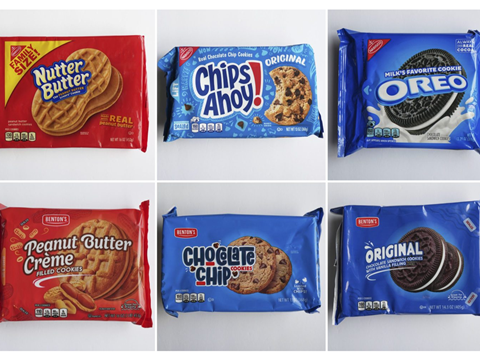
Mondelēz International has filed a lawsuit against Aldi, alleging that the packaging designs for several of its private-label products infringe trademarked visual properties and harm the reputation of several Mondelēz brands.
Filed in the United States District Court for the Northern District of Illinois, the lawsuit argues that the packaging for signature Mondelēz brands like Oreo, Ritz Crackers, Chips Ahoy, Wheat Thins, Nutter Butter, Nilla Wafers, and Original Premium Saltine Crackers has been “blatantly copie[d]” by Aldi to package private-label products.
This overlap is said to “dilute the distinctive quality of Mondelēz’s unique product packaging” – and side-by-side images compare the colour schemes, typography, and on-pack images of the Mondelēz and Aldi-brand packaging.
In Mondelēz’s view, such similarities are “likely to deceive and confuse customers” and “irreparably harm Mondelēz and its valuable brands.” It is perceived as a violation of the company’s trade dress – which, in trademark law, constitutes the visual identity of a product or its packaging.
Mondelēz seeks monetary damages and a court order banning Aldi from selling products that, in its opinion, infringe on its trademarks.
Going forward, Mondelēz will need to prove that the packaging can mislead consumers into purchasing an Aldi-brand product under the impression that it is the Mondelēz equivalent – and that Mondelēz has suffered financial loss as a result.
Previous legal action taken by Charlotte Tilbury owner Islestarr Holdings, Hampden Holdings, and Thatchers has found Aldi liable for copyright infringement in packaging designs that imitated those of their Filmstar Bronze and Glow makeup palette, children’s snack line Baby Bellies, and Cloudy Lemon Cider products, respectively.
According to AInvest, private-label products account for around 90% of Aldi’s sales. Lawsuits like these could potentially force the retailer to spend ‘millions’ on packaging redesign – an outcome feared to impact profitability with its ~2.3% net profit margin – while disincentivizing investors.
Yet, a previous lawsuit filed against Aldi by Moroccanoil Israel alleging that the retailer was distributing packaging with deceptive similarities to its Moroccanoil hair oil product was successfully appealed. In this case, the court did not find enough evidence that Aldi was deliberately passing off its product as another.
In similar news, ClientEarth, Surfrider Foundation Europe and Zero Waste France filed a lawsuit against Danone in 2023, claiming the corporation had violated France’s duty of vigilance law by failing to disclose its plastics usage. Danone has since reached an agreement with the NGOs in which it must publish a new vigilance plan, strengthen its plastics prevention policy, and attend annual meetings in the coming years.
Hagens Berman has also filed a class-action lawsuit against Procter & Gamble, asserting that environmental claims on the packaging for its Charmin toilet paper brand ‘mask’ the corporation’s ‘widespread deforestation practices’. The lawsuit brings claims of fraudulent concealment and violation of state-consumer protection laws surrounding fraud and the Federal Trade Commission’s Green Guides, as well as unfair competition and deceptive business practices.
If you liked this story, you might also enjoy:
The ultimate guide to the Packaging and Packaging Waste Regulation in 2025
How are the top brands progressing on packaging sustainability?
Everything you need to know about global packaging sustainability regulation in 2025
The key to increasing the use of reusable packaging in supermarkets













No comments yet